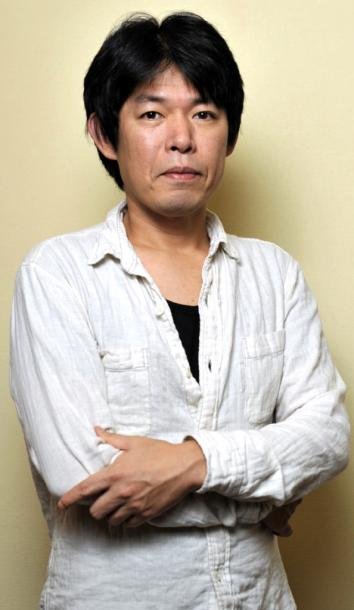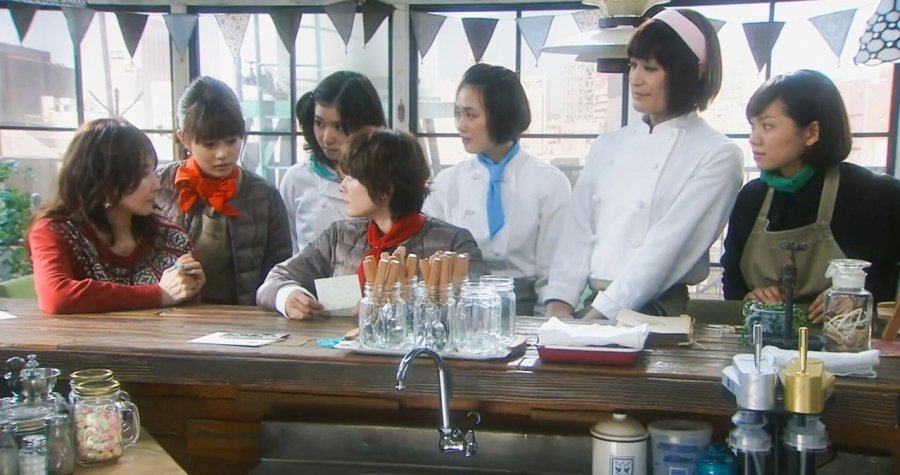 Gangnam B-Side's Ji Chang Wook reacts to being called the 'Son of Disney+'
Gangnam B-Side's Ji Chang Wook reacts to being called the 'Son of Disney+'
Sakakoto Yuji is a master of telling detail. His scripts say more about a character by ho w they choose to eat a pudding cup than most writers ever get to via direct exposition. He has written the most moving scene you will ever see based on grocery receipts. His best work ends on a cheerful smile that will bring you to tears whenever you bring it to mind years later. He is well known and lauded in Japan. He has won the Television Drama Academy award six times in the last thirteen years, including his most recent series from this summer: Omameda Towako to Sannin no Motootto (2021).
w they choose to eat a pudding cup than most writers ever get to via direct exposition. He has written the most moving scene you will ever see based on grocery receipts. His best work ends on a cheerful smile that will bring you to tears whenever you bring it to mind years later. He is well known and lauded in Japan. He has won the Television Drama Academy award six times in the last thirteen years, including his most recent series from this summer: Omameda Towako to Sannin no Motootto (2021).
This article will cover all of his works that have been subtitled in English to date and presents his many series and few movies in a rough order of suggested viewing - it’s not that any of his series are difficult to get into (they are all quite enjoyable), but some are deep and piercing, and others are light and frothy, and so the goal here is to give you a rough idea of how to proceed through his shows in a way that will keep you in that balance of light and dark. However, do dance through his works in whatever way strikes your fancy.
The Must-Watches
Saikou no Rikon (2013)
If you have not seen any of Sakamoto-sensei’s works, then Saikou no Rikon or The Best Divorce is undoubtedly the best place to start. It tells the story of two 30-ish couple’s disintegrating relationships, but it’s a comedy (with the usual caveat that “It’s a Sakamoto comedy: of course you’re going to cry.”). It features all of Sakamoto-sensei’s signature strengths: witty, quick dialogue; unlikeable characters that you will come to understand and to love, and a wise understanding of how humans are and the ways they can get in the way of themselves. Eita plays the protagonist Mitsuo who is fastidious and neat, but it’s Ono Machiko as Yuka, who steals the show as his messy and unreliable wife (both won Television Academy Awards for their performances here). Filling out the cast are Maki Yoko as the cool and aloof Akari and Ayano Go as the oblivious philanderer Ryo. This series was remade in Korea as Matrimonial Chaos starring Cha Tae Hyun and Bae Doo Na. Note that Saikou no Rikon is the rare drama for which you will want to watch all the way through the credits: the cast dances to Kuwata Keisuke’s song Yin Yang; and the dance is different each week, relates to the plot of the episode and tells its own little story. This series is also the only one by Sakamoto-sensei to have a reunion special; however, while it is worth seeking out, it appears only to be available on DVD at this point.
Tokyo Love Story (1991)
Tokyo Love Story was Sakamoto-sensei’s second series and is the reason for all of the rest of his works were able to be made. The series was such a huge rating success that it had been said that you could not find any women on the streets of Tokyo during the hour it was on every week, and at a rating of 32.3 % for the final episode, that might well have been true. It is a must-watch for its cultural impact: references to it in later J-dramas have appeared as recently this past summer (2021), where it received a name-drop in Nemesis. Filmed at the height of Japan’s boom in the 90s, it features shoulder pads and big hair - for the male cast members. Oda Yuji plays Kanchi, a sad sack from the sticks who has landed a job at a sporting goods company and reunites with two friends from high school, the hunky but terrible med-student Kenichi (Eguchi Yosuke) and the milquetoast Satomi (Arimori Narimi), who was Kanchi’s crush back in high school. But it is Kanchi’s strong, fiercely independent coworker Rika played by Suzuki Honami, who became the icon of what Japanese women identified with and aspired to be, and the reason why this series became the success that it was. It is a quintessential nighttime soap opera based on a manga, and it still holds up pretty well today. It was remade in 2020 in a grittier fashion that does not live up to Sakamoto’s original lively script.
Mother (2010)
Mother may be Sakamoto-sensei’s greatest work. However, with its depictions of child abuse and implied sexual abuse, you may wish to skip to another of his series before finding your way into this one. The consequences and effects from the abuse continue throughout the series, but the direct depictions of abuse are confined to the first episode or so, and so if you find such material triggering and can make it through that first episode, you will not see anything worse. In this series, a cool and detached bird researcher, Nao, played by Matsuyuki Yasuko, is supplementing her research income by teaching second grade when she discovers that one of her students, Rena, played by Ashida Mana, is being abused. When the local child protective services refuse to act fast enough, Nao fakes Rena’s death and kidnaps the child. The external impetus for the subsequent story is whether or not they successfully made a clean escape, but the story is more about what it means to be a mother, as reflected in Nao’s relationship with Rena, who she renames Tsugumi and Nao’s and Rena’s relationship to both their biological and adoptive mothers. It won all the awards. The series has been remade so far in Turkey, Korea, China, and Thailand. If you have only seen the Korean version, then you owe it to yourself to see the better-written original.
Featured Actor: Ashida Mana
If you only watch Mother in isolation, it is tempting to think that Ashida’s performance was solely the result of extremely lucky casting: they found a girl with that effervescent personality and strength of will. But, if you venture beyond Mother and explore her other roles in subsequent years, and, in particular, her role as Post in Ashita, Mama ga Inai you will see that, oh, no, not at all: what we have here is an acting prodigy. She was five when they started filming her as Tsugumi, and at five, she was already better than most professional actors in their 30s. Like Shirley Temple, the acting academies made up awards to give to her for her performance in Mother. Unlike Shirley Temple, the industry has seemingly treated her much better since: to this day, she is a staple on Japanese variety shows. Unsurprisingly, her roles thus far have largely been confined to a variety of daughter-to-the-protagonist roles of various weights, although she did have an interesting turn in the Vincent Schiavelli role in a gender-reversed version of the 1990 film Ghost. And she played the young Mako in Pacific Rim. She is in high school now, and if she chooses to continue to act, she will likely obtain international fame and recognition.
The Greats
Omameda Towako to Sannin no Motootto (2021)
Omameda Towako and Her Three Ex-husbands is the most recent series by Sakamoto-sensei and his first full-length series since 2017. This comedy series explores the life and relationships of a 40-something architect and head of a small firm providing designs for commercial buildings. Tawako, played by Matsu Takako, is a little quirky but confident and competent. She wants the best for her daughter and her reverse harem of exes but is looking beyond her past for romance. The series has some interesting and largely successful idiosyncrasies with a narrator (Sairi Ito, who won a Television Drama Academy Award for the narration) outlining the plot of each episode in a pre-title sequence, and Matsu (winner of Best Actress for the role) breaking the fourth wall at the start of the title and closing credit sequences. The series also carried home trophies for Best Screenplay, the Director Award for the three directors, and the Drama Song Award for the closing credit song, Presence. If you enjoy rap, watch through the credits of each episode for a cycle of five rappers paired with a different member of the principal cast rapping to Presence with Matsu (who also has had a successful career as a singer) singing the chorus.
Mondai no Aru Restaurant (2015)

A Restaurant With Many Problems is an ensemble comedy about institutional sexism in which seven people band together to start a restaurant to fight the Patriarchy. When Tanaka (Maki Yoko) starts working at a large corporation that develops and runs chain restaurants, she learns that her high school friend Satsuki (Kikuchi Akiko) has been blatantly sexually harassed by the top brass in the company. She quits the company in a blaze of glory and gathers a group of her unemployed friends to start a restaurant to directly compete with the new flagship that she had been developing for the corporation. The episodes focus in turn on the ways the women have experienced and continue to experience sexism in their work and personal lives. This series is the first in this list that features a found family, one of Sakamoto-sensei’s recurring themes. Here, the found family of Bistro Fou (look, they thought that’s how you spell “fire” in French, okay?) learn to work together to create a better world for themselves and others and fight the good fight, often in hilarious ways. The cast includes a murderers’ row of young actors who have since routinely led J-dramas, including Matsuoka Mayu as the chef Chika, Nikaido Fumi as the business manager Yumi and Mitsuki Takahata, who won Best Supporting Actress as the embodiment of internalized sexism, Airi. Yasuda Ken plays the pastry chef Haiji who identifies as a gay transvestite. The closing song is Mondai Girl by Kyary Pamyu Pamyu, who has a cameo in a later episode. Just as remembering the final scene of Mother will perpetually bring you to tears, remembering the final scene of Mondai no Aru Restaurant can always make you laugh.
Soredemo, Ikite Yuku (2011)
\
Still, Life Goes On is the story of two village families who were once close but have been driven apart by a tragedy in their past. Now Toyama Futaba (Mitsushima Hikari) and Fukami Hiroki (Eita) must work together to prevent that tragedy from recurring. This series is, in some ways, Sakamoto-sensei’s Romeo & Juliet, albeit much more somber and realistic. This melodrama dives into the press persecution, vengeance, family restitution, and punitive justice that arises from the rare violent crime in Japan. We may not get a smoopy balcony scene nor a double suicide denouement, but, nevertheless, a deep bond forms between the unlikely pair. Eita won Best Actor, Mitsushima won Outstanding Supporting Actress, and Kazama Shunsuke won Best Supporting Actor as Futaba’s psychopathic brother. The series as a whole won Best Drama, the directorial staff won Best Director, and, of course, Sakamoto-sensei won Best Screenplay.
Featured Actor: Eita
The once mononymous Nagayama Eita is such a chameleon as an actor that it’s quite possible to watch an entire series with him in a leading role only to discover, wait, that was him? A bit of that is wardrobe and hairstyle, of course, but, more to the point, his moment to moment character behaviors are often so unique to the character being portrayed that it’s hard to think that the same guy could be maintaining them for an entire series. Eita’s involvement in Sakamoto’s oeuvre began a couple of years into his career when he appeared in a couple of made for TV movies called Men’s Bath and Men’s Bath 2 (2003, apparently unavailable online and certainly with no English subtitles) that Sakamoto wrote under a penname. In addition to the trophies he’s garnered for Saikou no Rikon and Soredomo Ikite Yuku, he won a Best Supporting Actor from the film academy for Dear Doctor in 2009 and Best Supporting Actor from the television academy for this year’s Rikokatsu (2021).
Quartet (2017)
Quartet is Sensei’s series about the arts. Here the found family is a group of musicians who form a string quartet despite the fact that they all have issues and scandals in their past that should prevent them from doing so. The protagonist and lead violinist is Maki (Matsu Takako), whose husband disappeared several months before. Gentle and timid Matsuda Ryuhei plays the second chair Tsukasa whose family is wealthy enough to have a vacation home in Karuizawa which serves as the home base for the new group delightfully named Donuts Hole. Busker Mitsushima Hikari plays the cellist Suzume, who always has to play barefoot, and the lothario Issei Takahashi rounds out the foursome as the violist Yutaka. It is a series about finding your passion and following it. The group covers the usual classical repertoire, as you might expect, but they also have fun doing well-known video game themes. This series is, perhaps, the most well balanced of his works with both dramatic and comedic moments. It won a litany of awards including Best Drama, Best Actress for Matsu, Best Supporting Actress for Yoshioka Riho, Best Director, Best Song for おとなの掟, and Best Screenplay.
Sayonara Bokutachi no Youchien (2011)
Sakamoto-sensei has done at least seven movie scripts that have been produced, but only three have readily available English subtitles. Goodbye To Our Kindergarten is a made for TV movie about a group of kindergartners … No, wait! Come back! ... who escape their school and try to go see their sick friend who is three long train rides away. What seems like a rather banal plot becomes a surprisingly Ghibli-esque adventure in the hands of Sakamoto-sensei and is anchored by the always solid performance of Ashida Mana. Mitsushima Hikari (are we detecting a pattern here?) plays Mari, who was sneaking a smoke-break when she should have been watching the kids and is sent to track down the wayward children. It’s a story about the lies we tell children and the way they have of seeing right through them. Ashida won Best Actress, and Mitsushima won Best Supporting Actress for this film at the 2011 Tokyo International Drama Festival.
Woman (2013)
Woman is a melodrama about a single mom, Koharu, played by, you guessed it, Mitsushima Hikari. Koharu is struggling to care for her two children when she is diagnosed with an illness that’s going to require treatment, time in the hospital, and could be fatal. The healthcare bureaucracy requires her to exhaust all her family connections before providing the kind of help that will keep her children in daycare and school, and so she is forced to reconnect with her biological mother, who left her father for another man some twenty years before. And so, she does so for the sake of her children and encounters unexpected connections to her past. The script is probably overly reliant on some twists and revelations and only received some minor accolades, but Sakamoto-sensei weaves in themes of forgiveness, redemption and hope. And it has some good support performances by Rio Suzuki as Koharu’s daughter Nozomi and Nikaido Fumi as Koharu’s previously unknown step-sister Shiori. The series was remade in Turkey after the wild success of their version of Mother.
Featured Actor: Mitsushima Hikari
Mitsushima is one of the most frequent actors to feature in the main casts of Sakamoto-sensei’s projects to date. In addition to all of the above, she also shows up as Oto’s now-deceased mom in Love That Makes You Cry (see below). She’s a good, solid reactor and often brings some light goofiness to her roles, in addition to the stoicism and determination we find in her characters for Sakamoto’s series. It’s always hard to know how much control actors have over the projects they get to be in, but it should be noted that in all her main roles for Sakamoto-sensei’s series, here, Mitsushima always plays characters who have agency for both good and ill. Despite her obvious beauty, her characters are never the prize to be won. She’s superb in these roles of someone worn down by life, trying day by day to get along and make things better.
The Goods
Itoshi Kimi e (2004)
To The One I Love is a melodramatic love story between Shunsuke (Fujiki Naohito), a successful fashion photographer who has contracted a rare, incurable viral infection that will take his sight in the next few months, and Shiki (Kanno Miho), a young pediatrician who went to school with his brother and now works at the hospital where Shunsuke is being treated. The story is pretty much what you would expect given that set-up. It explores themes of grief and acceptance of circumstances beyond one’s control and coming to love someone for who they are. This series appears at this point on the list because it’s highly recommended that you see Kanno’s performance here before you watch her award-winning performance in Watashitachi no Kyokasho. The true star of this series is the song for the closing credits, To All Living Things (生きとし生ける物へ) by Naotaro Moriyama. How about a college club dance cover of the song with less than a thousand views?
Taiyo to Umi no Kyoshitsu (2008)
Homeroom On The Beach is a comparatively light high school drama set in Shonan. Oda Yuji stars as the ultracool teacher we all wish we had, Sakurai-sensei, but the focus of the series is on a group of high school friends and their final year in school together. Being a series by Sakamoto-sensei, this is not your typical shonen or shojo high school drama: expect something much more akin to Fame or My So-Called Life.
Featured Actor: Oda Yuji
It’s a bit of an understatement to say that Oda is a huge star in Japan. And his big break was as Sullen McFrownyface (aka Kanchi) in Tokyo Love Story. After winning several best actor awards for his subsequent TV roles, he went on to anchor a TV-to-film franchise, Bayside Shakedown, the second installment of which was the top live-action box-office ever in Japan and held that title for at least a decade. He’s also had a couple of gold records along the way. He is the prototypical, charismatic male lead, and so it was fun when he returned to Sakamoto-sensei’s series after he reached the height of his celebrity. The span of his roles here in this list shows him as more than just an action hero and reveal a satisfying range beyond the hunky guy everyone likes.
Watashitachi no Kyokasho (2007)
Our Textbook is Sakamoto-sensei’s dive into the dark sides of high school life and communitarian culture in Japan. The nominal protagonist is the freshly minted high school teacher Kohei (Ito Atsushi), who is pressured to conform to the schools’ position that the death of one of their students, Asuka (who fell from a school window), was an accident. However, a lawyer, Tamako (Kanno Miho), at the firm hired to defend the school against the investigation, has a connection to Asuka and digs in to uncover the truth. Tamako is cold and dogged to the point of expressionlessness, and so it really helps to see other performances by Kanno to understand why she won Best Actress for this part and appreciate the control and nuance she brought to the role. The series is dark; digging hard into bullying culture and how systems of face-saving can fail the victims and support the abusers. Our Textbook was the first in Sakamoto-sensei’s now overflowing trophy case full of Best Screenplay awards.
Top Caster (2006)
Top Caster is a delightful dramedy set in the high stakes world of nighttime TV news magazine shows. The series centers on Tsubaki (Amami Yuki), who has been pulled back from New York to anchor a new news show and focuses on her mentoring of Asuka (Yada Akiko), who Tsubaki instinctively plucks from her role as a weather presenter to mould into a cub reporter for the show. The series examines issues of ethics in journalism and what it means to maintain one’s integrity in such a fiercely competitive and public business. It is a very rare show, indeed, that centers and elevates the business relationship of two women and deserves watching for that fact alone. But the show is also a fun watch with some good twists along the way.
anone (2018)
Sakamoto-sensei has only rarely ventured any way close to genre fiction, but in anone he dips his toes into magical realism. A young homeless waif, Harika (Hirose Suzu), discovers a mysterious bag of cash with her friends at the ocean and gets pulled into a ring of reluctant misfit counterfeiters. Led by the mysterious Riichi (Eita), the plan is to produce bills that can be read by automated cash machines, make a quick profit and be done with it. But, of course, the plan goes awry, and there are crossings and double-crossings along the way that brings one of the Sakamoto-sensei best and strangest found families together. Harika also learns about her true past, makes a cutting sacrifice for a young, perpetual hospital patient she met and fell in love with online, and finds a maternal presence and bond to the print shop owner, Anone (Tanaka Yuuko). anone contains abundant themes of trust, acceptance and what it means to be family for each other.
Crying Out Love, In the Center of the World (2004)
This film was co-written by Ito Chihiro and Yukisada Isao and based on a YA novel by Katayama Kyoichi. It was the number one Japanese live-action movie in Japan in 2004, only being beaten at the box office by Howl’s Moving Castle for domestic films. It’s a tragic first-love story that is told in two time periods as Sakutaro (Osawa Takao in the present and Moriyama Mirai in high school in 1986) searches for his runaway fiancee in the present and deals with his grief over the all too perfect Aki (Nagasawa Masami) from his past. The film effortlessly shifts back and forth between the two time periods and somehow finds its way to Australia for its melodramatic climax. Nagasawa took home the Best Supporting Actress award at that year’s Japan Academy Prize, at which the film also won several best technical merit prizes.
Love That Makes You Cry (2016)
Love That Makes You Cry is a melodramatic romance featuring a love hexagon. The central pair are Ren (Kora Kengo) and Oto (Arimura Kasumi). Ren has come to Tokyo to earn enough money to take back the family farm that his grandfather was swindled out of. One day he finds a purse that his roommate has snatched and takes his work truck to the countryside to return it to Oto who uses the opportunity to escape from an arranged marriage that her guardians have set up for the maximum amount of cash they can get for her. The pair quickly lose touch, and Oto finds work as a healthcare worker where she meets Asahi (Nishijima Takahiro), who is the younger son of the owner of the chain of extended care facilities where Oto works. Sakamoto-sensei plants a major event at the halfway point of the series where there’s a large time jump to a time that brings all the characters back together to resolve all the feels. Kora won Best Actor for his role as Ren.
The Rest (But Still Worth Watching)
Living (2020)
NHK panicked at the beginning of the pandemic and got Sakamoto-sensei to crank out four short scripts that could be filmed in the actors’ homes. And we get this brief gem of Sakamoto short stories where he gets to explore a bit more genre fiction. Familiar actors from the Sakamoto stock company appear, including Hirose Suzu and her sister Hirose Alice as a pair of Neanderthals (just go with it) and Eita and his brother Nagayama Kento as a pair of brothers facing the prospect of their being on opposite sides of a dystopian civil war. And Sakamoto-sensei includes a self-insert character for each episode played by Abe Sadao, who argues with an acorn about whether humanity should continue to exist (to mixed success).
We Made A Beautiful Bouquet (2021)
We Made A Beautiful Bouquet is Sakamoto-sensei’s latest film. It is an elegiac look at the crumbling of a long-term relationship of a seemingly well-matched pair of twenty-somethings. It examines how the decisions we can make for the sake of a relationship can get in the way of that relationship. Arimura Kasumi is Kinu who loves manga, anime and video games, and Suda Masaki is Mugi, an aspiring illustrator who shares Kinu’s interests. The couple soon moves in together, but the inevitabilities of life begin to erode their relationship despite the shared interests and affection they share. As usual, Sakamoto-sensei drives a stake through your heart when the couple on the verge of breakup encounter a similar couple in the full bloom of what they once shared. (The shoes! OMG: the shoes!) The film did well, topping the box-office in Japan for 4 weeks and staying in theaters for six months.
Last Christmas (2004)
Last Christmas is a great big ball of delicious, delicious cheese. Oda Yuji reprises his true calling in the sporting goods industry as Kenji, who first meets his boss’ new secretary Yuki (Yada Akiko) on a company marketing ski-trip. Yuki seems to be hiding something, and Kenji is pulled into her orbit when she moves into the apartment next door that shares a door with his and: hijinks! The script seems to be driving towards something deep and, perhaps, dark… but: nope. Instead, enjoy the light Christmas romance and more than your required daily dosage of Wham!!!
Ryokiteki na Kanojo (2008)
My Sassy Girl is Sakamoto-sensei’s attempt to refashion the huge hit Korean movie My Sassy Girl from 2001 into an 11-episode comedic J-drama. Here the tormented goofball is Masaki (Kusanagi Tsuyoshi), a 30ish professor of Oceanography, and the love-lorn tormentress is Riko (Rena Tanaka). The series features many of the same scenes as the film, but Sakamoto-sensei seems to have made a rare strategical error in that some plot points that might be forgivable for a young, dumb Cha Tae Hyun are wholly unacceptable for a college professor. And the tone of the series is one in which a tiny young thing kicking a guy in the balls is always funny. Expect broad comedy in an academic setting where it’s not an easy fit. After an initial rush of viewers, the ratings dropped precipitously.
Saiyuuki (2006)
Sakamoto-sensei’s version of Journey To The West is included here for the sake of completeness because, while the series was hugely successful in Japan, being number one in the ratings for 2006 and having a higher average audience rating even than Tokyo Love Story, a version of the series with English subtitles has only appeared on DVD and does not seem to have escaped online. Sakamoto-sensei discards the stories from the Chinese classic almost entirely to tell his own stories in the universe of the Monkey King, and it is a lot of fun. The series is solidly pitched towards tweens and features a surprising amount of urination for humor. Nonetheless, the usual heroes are here, including Katori Shingo of SMAP as a dumb jock version of the Monkey King, Son Goku, and Ito Atsushi as the particularly cowardly version of Brother Pig, Cho Hakkai. Stealing the show quite literally is a completely new character, the thief Rin Rin played by Mizukawa Asami. The actor who played the role of Son Goku in the famous 1978 version of Saiyuki, Masaaki Sakai appears, appropriately, as The Buddha.
Mosaic Japan (2014)
You will likely be thinking: “Sakamoto-sensei wrote a porno, and you’ve waited until the end to tell us?” The temptation for some will be to go there immediately, and for others will be to avoid it entirely. The tone of this short series is not in favor of the adult video industry in Japan, but neither is it a polemic against it. The issue with the series is not one of its subject matter, really; instead, Sakamoto-sensei attempted something interesting as a writer, but the experiment was not entirely successful. The series is composed of relatively short scenes, and the intent was to have its themes arise from the larger picture they form. That is, the script itself is a mosaic, like the mosaic required by law in Japan to be used to hide the genitals in AV productions. It’s the story of Riichi (Nagayama Kento) who returns to his rural hometown after losing his job in Tokyo only to find that his town’s economy has been taken over by GALAXYZ, an AV production company. He finds a job in the finance department but is soon led deeper into the business. It’s not Sakamoto’s best, but he still makes interesting points, and there are good monologues in the fifth and final episode.








